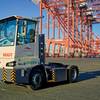Pension Funds Take Nautical Turn in Hunt For Higher Returns
Pension funds, squeezed by low interest rates, are exploring investments in shipping in their hunt for higher returns, hoping to benefit once this industry starts to recover from one of its worst ever downturns.
There are signs of a gradual pick-up in world trade and ship values for the first time since the financial crisis. Ship financier NordLB has said the market could see a broad recovery but not before 2016.
The industry's revival could deliver double-digit returns for pension funds that decide to add shipping to their so-called alternative assets such as infrastructure, which can make up about 15 percent of a fund.
But they need to do their homework.
Some hedge funds and private equity firms have been burned by diving into shipping too early and have found the recovery they were betting on has taken longer to materialise.
So far only a few pension funds have taken the plunge, also partly because of the need for specialised knowledge on shipping, such as how to price vessels accurately.
One pension fund leading the way is Ilmarinen in Finland, which had 34 billion euros ($41.83 billion) in assets at end-September. Earlier this year, Ilmarinen acquired five oil tankers and three supply ships from Finland's state owned refiner, Neste Oil.
Esko Torsti, head of non-listed investments at Ilmarinen, said the investment was for tens of millions of euros through a new joint-venture firm owned by the pension fund and Finland.
"Investing in ships is not the easiest area, it requires extreme carefulness and special expertise," Torsti said.
Another potential driver for investment is the shipping industry's growing funding gap that has opened up as banks scale back lending due to capital constraints.
The combined value of ships on the water is estimated at $1.25 trillion with a further $380 billion in ships on order.
Britain's Merseyside Pension Fund is making an investment in shipping via British asset manager Marine Capital. Marine Capital has already invested $200 million across seven dry bulk vessels in one fund and is aiming for around a further $1.4 billion across two more, one focused on more dry bulk ships and the other on container ships.
"As other assets were looking fully valued, I started to review shipping to see whether there was an opportunity," said Peter Wallach, head of Merseyside, which had about 6.1 billion pounds ($9.58 billion) in assets at March 31 this year.
"What appealed to me about the fund we used was that the managers were operators of the ships as well as financial investors in them," he told Reuters.
Wallach said they had already made annual returns in the low double digits, which had exceeded his expectations.
Under the arrangement, Marine Capital buys a series of ships and manages them for the life of the investment before selling them on. As the ships are leased out and controlled by Marine Capital, their costs are covered.
For Marine's Capital's third fund, focused on container shipping, investors would receive a coupon as income, as they would do in traditional bond markets, Marine Capital's chief executive Tony Foster said.
"If your coupon is around, say, 6 percent and it is a long- term business like 10 years plus, then your (return) is around 12 percent ... it would compare favourably with long-term bonds."
That long-term focus could be the crucial difference for pension schemes in terms of avoiding the pitfalls faced by some private equity and other funds with a shorter view.
"For people who have patient capital, who have underwritten well, who are counting on the underlying fundamental demand/supply to pay out, there is still a lot of money to be made," Ahmed Hamdani, managing director of Bayside Capital, said.
"For people who just wanted shipping exposure because it is a hot bet, they probably got their fingers burned a little bit."
Bayside is part of U.S. private equity group H.I.G. Capital, which has invested over $800 million in stainless steel chemical tankers.
For those not willing to take a punt on ships themselves, there are other ways to invest.
Denmark's Danica, for example, took a stake in shipping logistics firm Unifeeder, while Canada's OMERS, a $65 billion pension fund, bought a majority stake in ship management firm V.Group in 2011 for $330 million through its private equity arm.
"Shipping rates can fluctuate quite markedly," Mark Redman, Europe head at OMERS Private Equity, said. "However, ship services are much more solid and secure."
By Jonathan Saul and Simon Jessop













